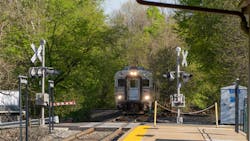NJ Transit, Rutgers University selected for grant to study improved pedestrian detection at rail crossings
New Jersey Transit (NJ Transit), in partnership with Rutgers University, has been selected for a grant award by the Federal Transit Administration (FTA) for the Safety Research and Demonstration Program.
Rutgers University in cooperation with NJ Transit received $357,000 to study pedestrian detection, one of 10 grants awarded throughout the country.
Rutgers University Center for Advanced Infrastructure and Transportation (CAIT) will utilize the funding to research and analyze pedestrian detection at NJ Transit highway rail crossings to reduce fatalities. New Artificial Intelligence (AI) technology will gather data and help transit agencies develop trespasser avoidance solutions.
“The funding provided by USDOT to Rutgers University will help NJ Transit develop innovative trespasser avoidance solutions – protecting NJ Transit customers, drivers, and pedestrians,” said NJ Transit President & CEO Kevin Corbett. “Ultimately, it will save lives, and the focus on Artificial Intelligence to gather data aligns perfectly with NJ Transit’s focus on technology to improve every aspect of our service. We thank USDOT and the FTA for their support, and their continuing efforts to improve transit service and safety in New Jersey.”
“Trespassing accounts for 17.6 percent of rail transit related deaths from 2010 to 2019. Tackling this challenge requires high-quality data and a deep understanding of trespassing,” said Ali Maher, director of the Center for Advanced Infrastructure and Transportation at Rutgers University. “The Rutgers-CAIT team under Prof. Xiang Liu and in collaboration with NJ Transit aims to develop a customized artificial intelligence-aided edge computing system for detection and analysis of trespassing at NJ highway and rail grade crossings. Our hope is to gain insight into the nature of trespassing, helping us to better educate the public and enforce solutions. “
The FTA Safety Research and Demonstration Program is designed to provide technical and financial support for transit agencies to pursue innovative approaches to eliminate or mitigate safety hazards.

